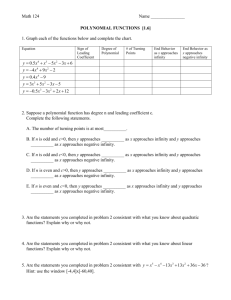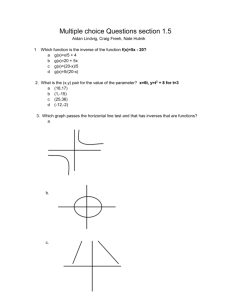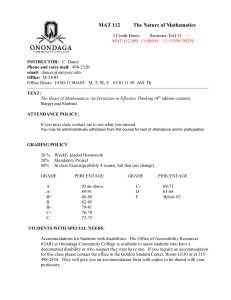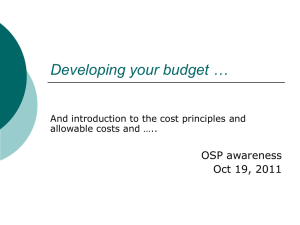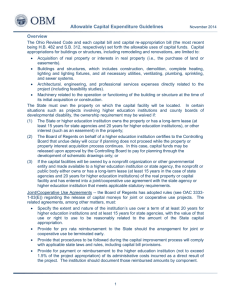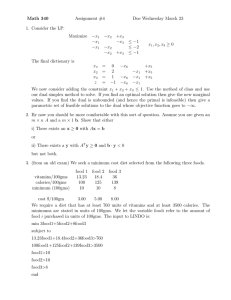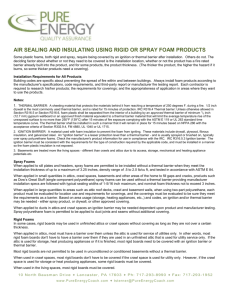Example Questions
advertisement
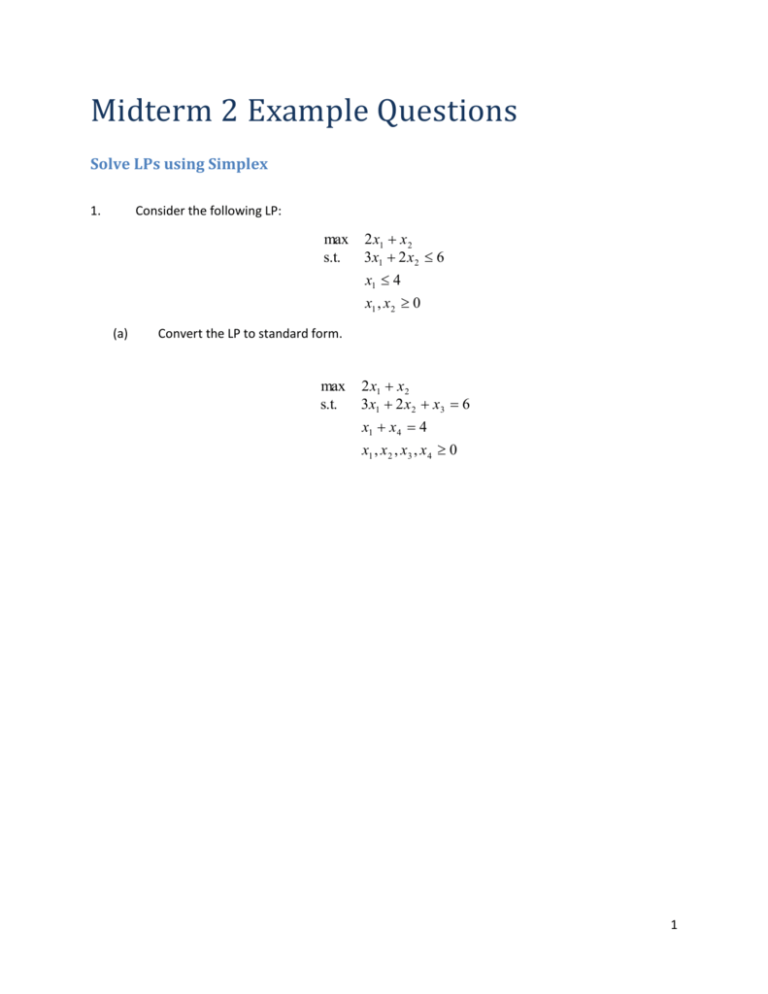
Midterm 2 Example Questions Solve LPs using Simplex 1. Consider the following LP: max s.t. 2 x1 x 2 3x1 2 x 2 6 x1 4 x1 , x 2 0 (a) Convert the LP to standard form. max s.t. 2 x1 x 2 3x1 2 x 2 x3 6 x1 x 4 4 x1 , x 2 , x3 , x 4 0 1 (b) Starting with x1 and x 2 as nonbasic variables, solve the problem using the Simplex algorithm. Explain why you terminated the algorithm. max x1 x2 x3 x4 c 2 1 0 0 b 3 2 1 0 6 1 0 0 1 4 N N B B x(0) 0 0 6 4 x1 1 0 -3 -1 cx1=2>0 x2 0 1 -2 0 cx2=1>0 = 2 = 4 A B N N B x(1) 2 0 0 2 x1 -0.6667 1 0 0.66667 cx1=-0.333<0 x2 -0.3333 0 1 0.3333 cx2=-0.6667<0 Optimal solution found! x * 2 0 0 2 2 (c) Now, assume that the first constraint is dropped. Using a Simplex algorithm solution, show what happens to the optimal solution. Explain. max x1 x2 x4 c 2 1 0 b A 1 0 1 4 N N B x(0) 4 0 0 x1 1 0 -1 cx1=2>0 x2 0 1 0 cx2=1>0 Can move in improving direction x2 forever Problem unbounded! 3 Sensitivity Analysis 1. As a result of a recent decision to stop production of toy guns that look too real, the SuperSlayer Toy Company is planning to focus its production on two futuristic models: beta zappers and freeze phasers. Beta zappers produce $2.50 in profit for the company and freeze phasers $1.60. The company is contracted to sell 10 thousand beta zappers and 15 thousand freeze phasers in the next month, but all that are produced can be sold. Production of either model involves three crucial steps: extrusion, trimming, and assembly. Beta zappers use 5 hours of extrusion time per thousand units, 1 hour of trimming time, and 12 hours of assembly. Corresponding values for freeze phasers are 9, 2, and 15. There are 320 hours of extrusion time, 300 hours of trimming time, and 480 hours of assembly time available over the next month. max s.t. 2500 x1 1600 x 2 x1 10 x 2 15 5 x1 9 x 2 320 x1 2 x 2 300 12 x1 15 x 2 480 x1 , x 2 0 OBJECTIVE FUNCTION VALUE 1) 77125.00 VARIABLE VALUE REDUCED COST X1 21.250000 0.000000 X2 15.000000 0.000000 ROW 2) 3) 4) 5) 6) 7) 8) SLACK OR SURPLUS 21.250000 0.000000 78.750000 248.750000 0.000000 21.250000 15.000000 DUAL PRICES 0.000000 -1525.000000 0.000000 0.000000 208.333328 0.000000 0.000000 RANGES IN WHICH THE BASIS IS UNCHANGED: OBJ COEFFICIENT RANGES VARIABLE CURRENT ALLOWABLE ALLOWABLE COEF INCREASE DECREASE X1 2500.000000 INFINITY 1220.000000 X2 1600.000000 1525.000000 INFINITY ROW 2 3 4 5 6 7 8 CURRENT RHS 0.000000 15.000000 320.000000 300.000000 480.000000 0.000000 0.000000 RIGHTHAND SIDE RANGES ALLOWABLE ALLOWABLE INCREASE DECREASE 21.250000 INFINITY 17.000000 15.000000 INFINITY 78.750000 INFINITY 248.750000 189.000000 255.000000 21.250000 INFINITY 15.000000 INFINITY 4 a) Is the optimum solution sensitive to the exact value of trimming hours available? If not, at what number of hours capacity would it become relevant? No there is a slack of 248.75. Hence, it is relevant at 300 – 248.75 = 51.25 hours. b) How much should SuperSlayer be willing to pay for an additional hour of extrusion time? For an additional hour of assembly time? Look at the dual prices. It is 0 and 208.33 for extrusion time and assembly time, respectively. This is what they should be willing to pay. c) What would be the profit effect of increasing assembly capacity to 580 hours? To 680 hours? Profit Increase to 580 hours (increase of 100) is within the allowable increase (189), so it is simply 100 x 208.33 = $20,833 Increase to 680 is outside the allowable increase, but we can bound it with: RHS At least 189 x 208.33 = $39,374 480 481 At most 200 x 208.33 = $41,666 d) 669 680 What would be the profit effect of increasing the profit margin on beta zappers by $1500 per thousand? What would be the effect of a decrease in that amount? Increase of $1500 is inside the allowable increase (infinity). Hence profit would increase by $1500 x 21.25 = $31,875 Profit Decrease of $1500 is outside the allowable decrease of 1220. However, we can again bound it. The decrease in profit would be At least $1220 x 21.25 = $25,925 5 c1 1000 2280 2500
